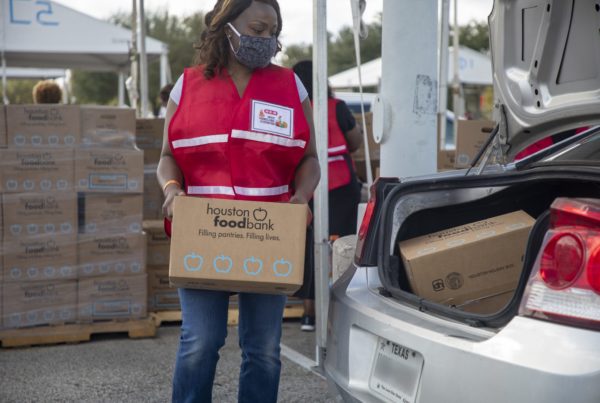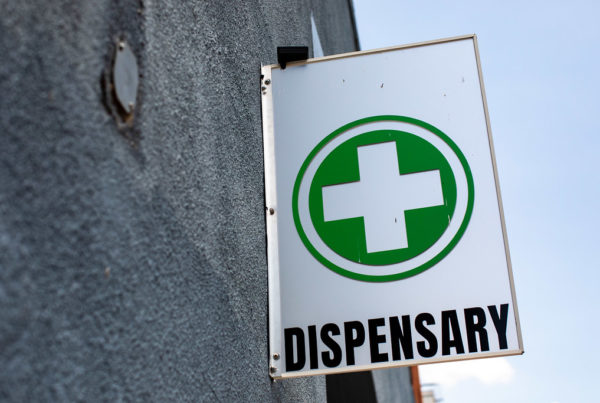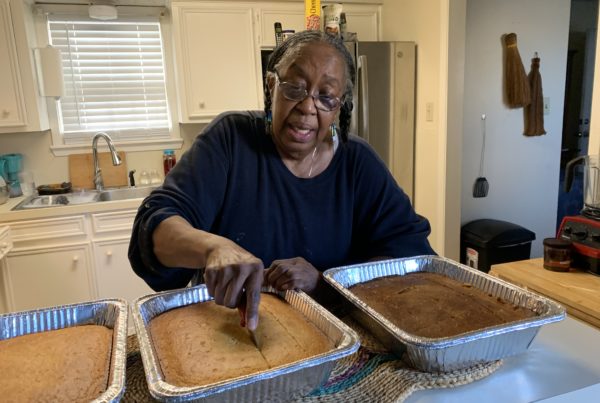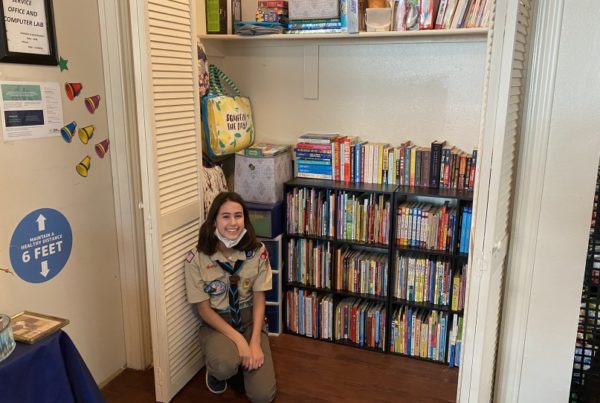From KERA:
On a chilly Saturday morning in early December, a long line formed outside Tamales Lupita, a popular spot on the outskirts of El Paso County. People stood, bundled up in jackets and face masks, and waited to place their orders for tamales or burritos to go.
Fabiola Rodriguez wove through the line, approaching people in English and Spanish.
“Do you live in El Paso County?” she asked. “We are giving away information for people that have been negatively impacted by COVID. Like, they lost hours at work, lost their job, or lost somebody.”
Rodriguez is a promotora de salud, or community health worker. She and her team spend their days outside local businesses, grocery stores and a food bank, sharing valuable guidance on navigating the pandemic.
On this morning, she handed each person a plastic bag, filled with a small bottle of hand sanitizer and two washable, reusable masks: one child-sized, one for adults.
She also handed out packets, with information on COVID-19 prevention and resources for people who need help paying rent, or covering funeral costs.
“It’s not only about reduce the risk of COVID, but reduce the risk of financial hardship,” she explained.
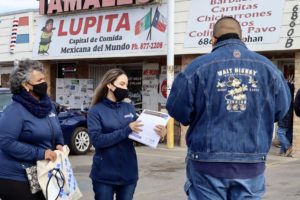
Promotoras Fabiola Rodriguez and Lizeth Carrillo offer a COVID-19 information packet to a man waiting in line for tamales on Dec. 12, 2020. The packet includes resource on everything from how to wear a mask properly to how to apply for rental assistance. “This campaign is not just about physical health, but it’s also about mental health and finding solutions for people’s needs,” Rodriguez said.
Mallory Falk
The promotora program has been in El Paso for decades, designed to spread public health information in remote, under-resourced areas like colonias. The model started in Mexico, spread throughout Latin America, and has expanded to border communities in the U.S.
“It was such a natural fit that the promotora program came here because of the culture, because of the language, because of the understanding,” said Bibiana Mancera with the Border Biomedical Research Center at the University of Texas at El Paso.
To become promotoras, people go through an intensive training program and receive certification from the State of Texas. They are mostly women, well-known and well-respected in their communities.
“Within our culture, we’ll heed the advice of our family and friends and our neighbors before we actually seek the advice of a professional,” Mancera said.
Physicians and nurses are respected, she said, but they’re often strangers. “A promotora may be your neighbor down the street, or so-and-so’s aunt. So there is this connectedness that is critical and crucial to why the program works here.”
For people reluctant to seek out medical care because they don’t have resources, promotoras can steer them to health clinics where they won’t be denied care.
“There’s that element of trust, and that is really critical when we deal with underserved and vulnerable populations,” she said.
Mancera is currently coordinating a COVID-19 community outreach project in rural west El Paso County that includes promotoras like Fabiola Rodriguez. Other promotoras are engaged in similar work in rural east El Paso County, through the Texas A&M University Colonias Program. El Paso County and the Paso del Norte Health Foundation are also partners on the project.
The campaign took shape in October, as COVID-19 cases spiked, hospitals reached capacity and the region became a hotspot for the virus. Promotoras received training on COVID-19 basics and safety precautions for people who live with extended family — critical information, in communities where many people don’t have the option to work from home and live in multigenerational households.
As it became clear that COVID-19 is disproportionately killing Latinos, both nationwide and in El Paso, it felt especially critical to reach some of the most under-served communities along the border.
Rodriguez, the promotora stationed outside Tamales Lupita, said many people seek her out, told by friends or relatives to go find “these ladies in the blue jackets.”
So many stories stand out. The pregnant woman who wasn’t sure how she’d pay her rent. The man who lost four family members to complications from COVID-19 and was struggling with grief and funeral expenses. Rodriguez shared the name of a group who could help cover costs and also lent a compassionate ear.
“Just to tell us what was happening in his life, it was a relief for him,” she said.
Many people approach her with concerns about their mental health during the pandemic — struggles they may not want to share with immediate family members.
“People is not too open to talk about in their own circle but with us they open up a little bit more,” Rodriguez said. She can connect them with crisis counselors and offer suggestions for coping with anxiety or depression.
For Rodriguez, this work is personal. A little over a decade ago, she had a brain aneurysm, which knocked her flat for several years. Once she recovered, she knew she wanted to work in the community, helping others navigate the health care system. Before the pandemic, she served as a breastfeeding peer counselor.
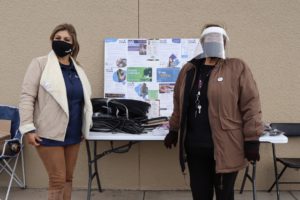
Promotoras Teresa Gerber and Socorro Linden stand outside an auto shop on Dec. 12, 2020, catching customers on their way out and sharing information about COVID-19.
Mallory Falk
Just across the parking lot, two more promotoras — Socorro Linden and Teresa Gerber — stood outside an auto shop, rubbing their hands together to stay warm in between talking to customers.
The people who do this work feel a strong, internal drive to serve their community, Linden said.
“A canary, by its nature, sings. It needs to,” she said. “We have the same internal need.”
Linden loves working in a predominantly Hispanic community, where many people have immigrated from Mexico — because that’s her experience, too. She came to the U.S. when she was young, and still has family and “one foot” in Mexico.
“You relate to the people within the community and right away you understand their needs and you know what they’ve been through because you have similar experiences,” she said.
Geber’s daughter jokes that she has a gift for being in everyone’s business.
“She always says ‘No Mom, I’m not going with you to the store because it takes a long time. Everyone knows you and you spend so long chatting with everyone,’” Gerber laughed. “I’ve always wanted to be involved in peoples’ lives. I have a passion for people, for helping.”
Gerber recently lost a dear friend to COVID-19. She had been feeling sick for a while and was struggling to breathe, so Gerber took her to the hospital. It was hard not being there, in the room, for her final moments; the experience only strengthened Geber’s resolve to do this work.
There are limitations. Promotoras try to connect with people who are traditionally harder to reach — who might not have transportation, cell phone data or internet access. But right now, with COVID-19 cases surging, it feels too risky to go door-to-door.
Sometimes people approach the promotoras and let them know about a neighbor or community member who could use some assistance.
“People come to us [and say], you know, ‘I know this elderly lady, she lives alone and it seems like she probably is not getting the right help,’” Linden said. Promotoras can follow up on these leads.
But they also rely on the people they reach here, in parking lots, to go back and share what they’ve learned with others.
“Please pass on this information to someone you think might need it,” Fabiola Rodriguez said, as she handed out packets to people lined up outside Tamales Lupita.
A woman named Leticia Marquez eagerly flipped through the pages. She came here to pick up sweet tamales, after hearing about this spot on the radio.
“They said that the tamales are really good here,” she laughed. “That’s the only reason I came.”
While Marquez didn’t need the resources Rodriguez shared, she knew some people who would. Two of her cousins and two close friends lost their jobs because of the pandemic and were worried about paying rent.
“I’ll bring this to them,” she said, clutching the packet tight to her chest.
Marquez came out in search of top-notch tamales. She didn’t expect to also find such helpful resources for her loved ones.
“Thank God I stumbled across this,” she said.
The promotora program is part of a COVID-19 community outreach campaign run by the County of El Paso and the Paso del Norte Health Foundation. For more resources and information, visit reducetherisk915.org.
Mallory Falk is a corps member with Report For America, a national service program that places journalists into local newsrooms. Got a tip? Email Mallory at Mfalk@kera.org. You can follow Mallory on Twitter @MalloryFalk.
KERA News is made possible through the generosity of our members. If you find this reporting valuable, consider making a tax-deductible gift today. Thank you.







